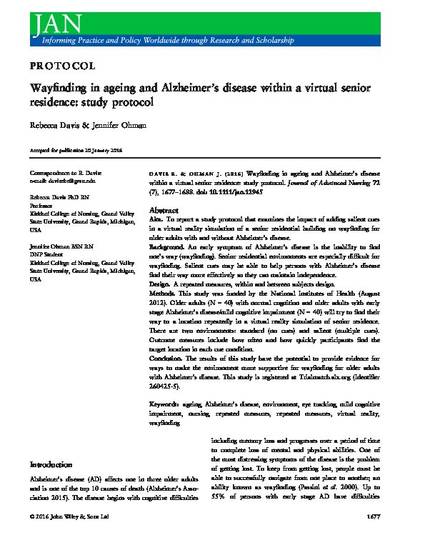
Article
Wayfinding in ageing and Alzheimer's disease within virtual senior residence.pdf
Journal of Advanced Nursing
(2016)
Abstract
Aim: To report a study protocol that examines the impact of adding salient cues in a virtual reality simulation of a senior residential building on wayfinding for older adults with and without Alzheimer's disease.
Background: An early symptom of Alzheimer's disease is the inability to find one's way (wayfinding). Senior residential environments are especially difficult for wayfinding. Salient cues may be able to help persons with Alzheimer's disease find their way more effectively so they can maintain independence.
Design: A repeated measures, within and between subjects design.
Methods: This study was funded by the National Institutes of Health (August 2012). Older adults (N = 40) with normal cognition and older adults with early stage Alzheimer's disease/mild cognitive impairment (N = 40) will try to find their way to a location repeatedly in a virtual reality simulation of senior residence. There are two environments: standard (no cues) and salient (multiple cues). Outcome measures include how often and how quickly participants find the target location in each cue condition.
Conclusion: The results of this study have the potential to provide evidence for ways to make the environment more supportive for wayfinding for older adults with Alzheimer's disease. This study is registered at Trialmatch.alz.org (Identifier 260425-5).
Disciplines
Publication Date
2016
DOI
doi: 10.1111/jan.12945 https://www.ncbi.nlm.nih.gov/pubmed/26915997
Citation Information
Rebecca Davis. "Wayfinding in ageing and Alzheimer's disease within virtual senior residence.pdf" Journal of Advanced Nursing (2016) Available at: http://works.bepress.com/rebecca-l-davis/8/
